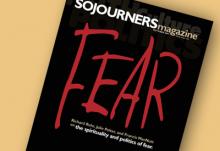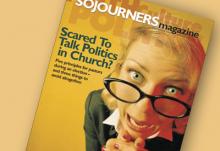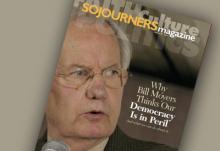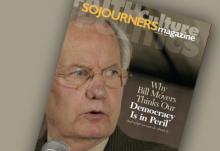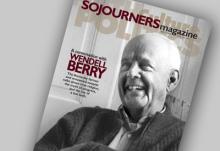Back in the ’70s I was trudging through the planning phase of a master’s thesis on Puritan devotional poetry, and I happened to catch lunch with someone who read me a quote...
Feature

Spiritual leaders gently guide bereaved souls through the holy land of grief and loss.

Paul's letters talk about Jesus' radical new vision of believers as family. But some Bible translations miss the point altogether.
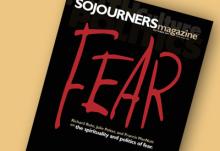
Evangelicals in the United States are increasingly estranged from their counterparts everywhere else.
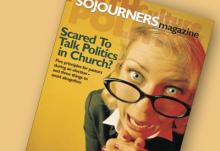
Volunteers from around the world work for peace in Palestine simply by being there.
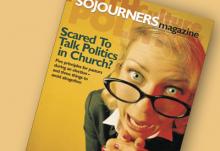
Even as atrocities in western Sudan have drawn the world's focus in recent months, there are signs of hope elsewhere in the nation, which has been ravaged by civil war for three or four decades.
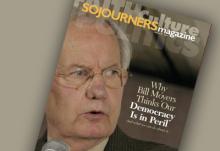
It's not that we have so little power, it's that we don't use the power we have.
Early in Dostoevsky's novel The Brothers Karamazov, a wealthy woman asks Staretz Zosima how she can really know that God exists. The elderly monk tells her that no explanation or argument can achieve this, only the practice of "active love."
The woman then confesses that sometimes she dreams about a life of loving service to others - she thinks perhaps she will become a Sister of Mercy, live in holy poverty, and serve the poor in the humblest way. But then it crosses her mind how ungrateful some of the people she would serve are likely to be. They would probably complain that the soup she served wasn't hot enough or that the bread wasn't fresh enough or the bed was too hard. She confesses that she couldn't bear such ingratitude - and so her dreams about serving others vanish, and once again she finds herself wondering if there really is a God. To this the Staretz responds, "Love in practice is a harsh and dreadful thing compared to love in dreams."
I often heard Dorothy Day recite those words. I doubt any chapter in any work of literature had so much importance for her. She had first read Dostoevsky's novel when she was in her teens. It was partly through Dostoevsky that she formed an understanding of Christianity that wasn't typically Western, seeing it not simply as an institutional structure but as a way of life in which nothing was more important than seeing Christ in others.
Of course there were many other influences. Her understanding of basic Christianity was partly shaped by the emphasis on hospitality in the Holy Rule of St. Benedict, with its requirement that "each guest must be received as if he were Christ." There was also the influence of St. Francis of Assisi, who gave an example of downward mobility rather than upward mobility, whose life was the opposite of a rags-to-riches chronicle. He was one of the sources of the stress she put on what she called "voluntary poverty."
On the surface, the staff of Word Made Flesh might seem easily pigeonholed as standard-issue evangelicals. These are the kind of Christians who close their eyes and raise their hands while singing worship tunes. The stereotype is that these are also the kind of Christians for whom faith means only individual piety. But these young people are choosing to live in the world's most destitute urban slums, among the poorest of the poor. Why? Because the Bible tells them so.
In Galati, Romania, Word Made Flesh's largest drop-in center is a fully functioning three-ring circus of street kids, staff members, and stray dogs. The center has the usual services, but also offers amenities that are meaningful to children who sleep in alleys - laundry facilities, an art center, a woodworking and stonemasonry workshop, and individual lockers. The Galati center also has a terraced garden for which the children share responsibility. "[It will] teach the kids a usable skill as well as provide food," staff member Bill Haley notes. "Part of their learning is to participate in the work of...the place that is meant for them and is truly theirs."
In El Alto, Bolivia, initial research revealed that women in prostitution were receiving little attention or care. After visiting brothels and becoming acquainted with the women who worked there, Word Made Flesh built a drop-in center that has become a safe haven and lunchtime gathering spot. The women named it "House of Hope," and in addition to the reading groups and social gatherings it hosts, it will soon offer free medical care, counseling, legal services, and job training to the women and their families.
In the mid-1990s, following Bill Clinton's second electoral ride to the White House, the vibrancy of Religious Right organizations appeared to be on the wane. Outside the sanctuary of the fundamentalist church, Jerry Falwell and Pat Robertson had become public caricatures of intolerance and zealotry. Pundits in the media and the liberal church deemed the movement torn, shattered, and perhaps dead.
How then, less than a decade later, has the Religious Right become a powerful sector of the Republican Party, holding veto power over most any GOP maneuver?
"The Religious Right has been institutionalized within the Republican Party," confirms Kenneth Wald, a professor of political science at the University of Florida at Gainesville. "Just look at the leaders of the GOP."
Note the top seven ranking Republicans in the U.S. Senate: Bill Frist, Tennessee; Mitch McConnell, Kentucky; Rick Santorum, Pennsylvania; Bob Bennet, Utah; Kay Bailey Hutchinson, Texas; Jon Kyle, Arizona; and George Allen, Virginia. Other than party affiliation, what do these senators all have in common? Each has earned a 100 percent rating on the Christian Coalition's scorecard, voting in accordance with that organization's positions on key legislation.
A similar pattern exists among the Republican leadership in the U.S. House of Representatives. Majority Leader Tom DeLay of Texas, who in part controls whether an issue will be even debated on the House floor, also receives a 100 percent on the Christian Coalition scorecard.
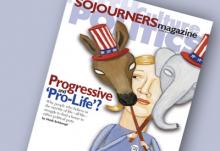
Why the language of the marketplace shouldn't rule our moral and political thinking.
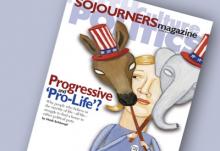
Many Christians went to the former Soviet Union to evangelize. While there some discovered Russia's new gulags, and found themselves converted to a deeper understanding of the gospel.

